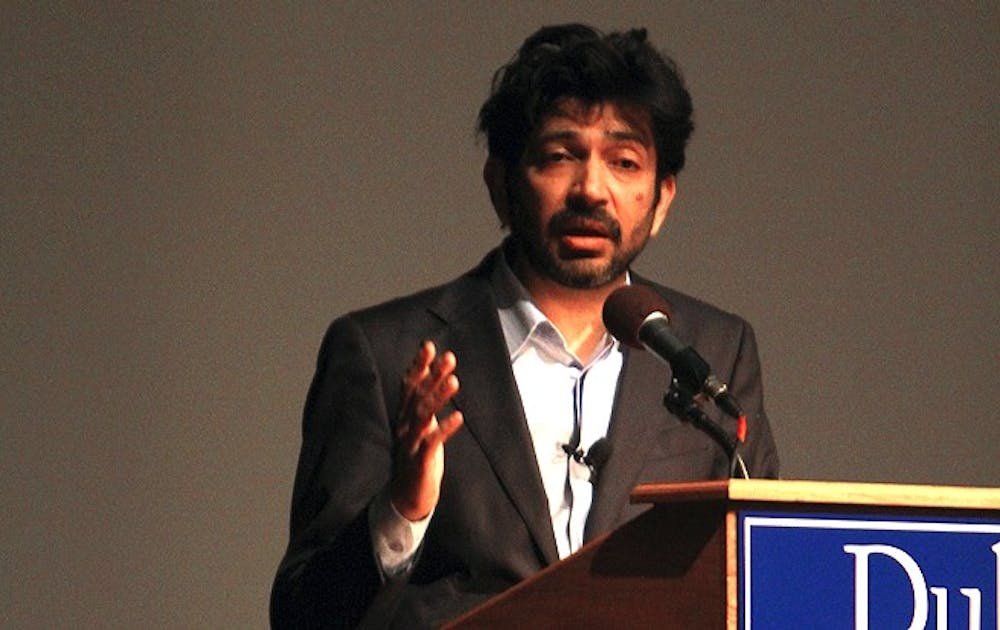Throughout history, medical understanding of cancer has not always been as promising as it is now, Pulitzer Prize-winning author Dr. Siddhartha Mukherjee said Wednesday.
To a packed audience in Page Auditorium, Mukherjee spoke about his book Emperor of All Maladies: A Biography of Cancer, for which he won the 2011 Pulitzer Prize for nonfiction. The book gives historical and medical context to civilization’s struggle with cancer throughout time. In his presentation, Mukherjee, an assistant professor of medicine at Columbia University, discussed the history of the disease in human society by outlining numerous breakthroughs in cancer research.
“The first major idea was that cancer is a disease of cells,” Mukherjee said. “In 2012, we take this fact for granted. However, in the late 1800s and 1900s—when it was discovered that cancer is deregulated growth in our own cells—it was considered deeply radical and had many opponents.”
Most past theories about cancer were riddled with errors, Mukherjee said, noting humorism in particular. The ancient theory postulated that black bile—a fictional substance—causes cancer. He added that this was the standard understanding of cancer for much of the disease’s history.
A strong push toward cancer research in the United States began in 1971 when the National Cancer Act was passed. After this movement began, scientific research eventually revealed an understanding of how cancer cells reproduce. When people began to understand cancer, the disease became part of public discourse, Mukherjee said.
“Cancer is not just a disease of cells but a disease of genes.” Mukherjee said. “If you take your own genes that cause normal growth and deregulate them, you unleash the dark side of the same growth, thereby unleashing cancer.”
Despite initial challenges with research, modern technology has rapidly progressed humans’ understanding of cancer, he said.
Going forward, the next big challenge in cancer research is dealing with the diversity of cancer genes. For example, even though breast cancer cells may appear similar, the mutations that cause the cancer are different for each person, he said. The challenge is finding the cancer variants even though there is tremendous diversity among individuals.
“Every breast cancer is unique in the same sense that every person who has breast cancer is unique,” he noted.
Mukherjee’s lecture was hosted by Duke University Libraries’ Weaver Memorial Lecture series and cosponsored by the Office of the Provost, Office of the Chancellor for Health Affairs, Duke Department of Medicine and Duke Cancer Institute. The series, which holds lectures every other year, was established in memory of William Weaver, a former member of the Library Advisory Board and Trinity ’72. It has featured several prominent authors, such as Barbara Kingsolver, Dr. Oliver Sacks and Dave Eggers.
“We always try to get someone who thinks big, writes extremely well, will inspire conversation and will appeal to the broadest possible audience at Duke,” wrote Aaron Welborn, director of communications for the libraries, in an email Tuesday. “It’s hard to think of a more universal topic [than cancer] whose details so few of us really comprehend.”
Welborn also said Mukherjee toured the Duke Cancer Center while at Duke, and he met with President Richard Brodhead and Dr. Victor Dzau, chancellor for health affairs and president and CEO of the Duke University Health System.
Many students said they attended the lecture because they are interested in the history of cancer. Sophomore Amee Tan noted that she wanted to learn about the intersection between medicine and history.
“I was curious to see where our knowledge of cancer began and how it has evolved over the last 150 years,” Tan said. “I wanted to hear Dr. Mukherjee’s perspective because cancer is such a prominent disease.”
Get The Chronicle straight to your inbox
Signup for our weekly newsletter. Cancel at any time.

